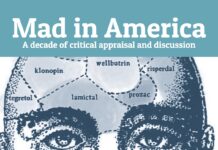Understanding the Youth Mental Health Crisis: An Interview with Elia Abi-Jaoude
The child psychiatrist talks about the importance of seeing the big picture and why parents shouldn't "be afraid if their kid is in distress."
Thomas Jobe: The Legacy of Research He Leaves Behind
Thomas Jobe was a collaborator in a longitudinal study that upended conventional thinking about antipsychotics. He died March 16.
A Neuroscientist Evaluates the Standard Biological Model of Depression
Current evidence does not support a biological hypothesis of depression. It is far better predicted by levels of childhood trauma, life stress, and lack of social supports.
Inside a Forensic Psychiatry Unit: Here’s How to Survive
Sean Gunderson, who was detained by the criminal justice system for 17 years after receiving an NGRI verdict, documents the life of a forensic psychiatry inmate.
Our RCT Fetish: How the “Gold Standard” for Research Has Led to A Societal...
After Joanna Moncrieff and colleagues published their study debunking the low-serotonin theory of depression, the editor of Mad in Sweden, Lasse Mattila, wrote Sweden’s...
Medicating Preschoolers for ADHD: How “Evidence-Based” Psychiatry Has Led to a Tragic End
The prescribing of stimulants to preschoolers diagnosed with ADHD is on the rise, which is said to be an "evidence-based" practice. A review of that "evidence base" reveals that claims that ADHD is characterized by genetic and brain abnormalities are belied by the data, and that the NIMH trial of methylphenidate in this age group told of long-term harm.
A New Paradigm for Testing Psychiatric Drugs Is Needed
This paper reviews the problems with the usual double-blind, placebo-controlled trials on which drug approvals are based, and advocates for a stricter form of testing psychiatric drugs with patient-relevant outcomes, real comparators, long-term outcomes, and assessment of harms.
Suicide Hotlines and the Impact of Non-Consensual Interventions
Those struggling with suicidal thoughts may stay silent instead of reaching out to suicide hotlines because they fear non-consensual intervention and the harmful impact of police involvement.
Trusting People as Experts of Themselves: Sera Davidow on the Wildflower Peer Support Line
Sera Davidow is a filmmaker, activist, advocate, author, and mother of two very busy kids. As a survivor of physical, sexual, and emotional abuse...
Tara Thiagarajan: Mental Well-being Better in Venezuela than in United States: Why?
Tara Thiagarajan is founder and chief scientist of Sapien Labs, a nonprofit organization that runs the Mental Health Million Project, we discuss its annual Mental State of the World Report, which uses an online survey to track mental wellbeing among internet-enabled populations around the world.
The Medicalization of Women’s Suffering: An Interview with Dana Becker
MIA’s Ayurdhi Dhar interviews Dana Becker about how therapeutic culture fails to adequately address women’s suffering.
Behaviorists Must Confront Psychiatry’s Pseudoscience
Despite the well-documented greater effectiveness of behavior therapy, psychiatry's choice of treatment for mental disorder heavily favors drugs.
Psychiatry Is the Cause, Not the Solution
I have found that trauma is frequently at the root of many eventual psychological and medical issues. Medications often only worsen the disconnection caused by trauma.
Critical Psychology for a Better Society: An Interview with Sebastienne Grant
Micah Ingle interviews Sebastienne Grant about her work developing a critical psychology program to reimagine and restructure social systems.
Mad in America’s 10 Most Popular Articles in 2022
A roundup of Mad in America's most read blogs and personal stories of 2022 as chosen by our readers.
Screening for Perinatal Depression: An Effective Intervention, or One That Does More Harm Than Good?
Why does the U.S. describe perinatal screening as providing a proven benefit, while the task forces in the U.K. and Canada see no evidence of such benefit?
Australia’s Billion-Dollar Question: Why Is Mental Health Not Improving With Better Access?
Amid growing mental health crisis, research raises questions about the mass rollout of brief psychotherapies in Australia.
Psychotherapy Can Prevent Relapse When Discontinuing Antidepressants
“Short and simple psychological programs can prevent people from relapsing when they stop their antidepressants.”
Akathisia: Very Nearly the Death of Me
Akathisia is truly an indescribable thing—and has to be one of the most hellish experiences on earth. It’s like your brain is hijacked. Every day I thought could be my last.
The Year Of Potentiality
I lost three years of my life to my first psychosis. I am living proof that your entire world can be smashed into a trillion pieces and you can recover and turn the broken pieces of glass into a kaleidoscope.
Psychiatrogenesis (Whither Psychiatry or Reform)
Preying on the privatisation of distress comes the medical-industrial complex perverting the mental health landscape.
Ten Years of Rocking the Boat: Reflecting on Mad in America’s Mission and Work
Continuing our 200th podcast, staff members join us to discuss reinvigorating MIA continuing education, science writing and blogs, personal stories, community commenting and family resources.
Emotional CPR: Heart-Centered Peer Support
Two National Empowerment Center leaders discuss eCPR, a process for helping youth—or anyone—through an emotional crisis using three simple steps.
SSRIs, Lindsay Clancy, and Me
Sharing the similarities between Lindsay Clancy's homicidal episode and my own will hopefully help prevent rare SSRI-induced suicides and homicides, including mass shootings.
The Serotonin Zombie: Authors of New Study Try to Breathe New Life into the...
Despite new claims that their study provides "clear evidence" linking serotonin and depression, their data actually supports the opposite conclusion: serotonin levels did not correlate with depression.

































